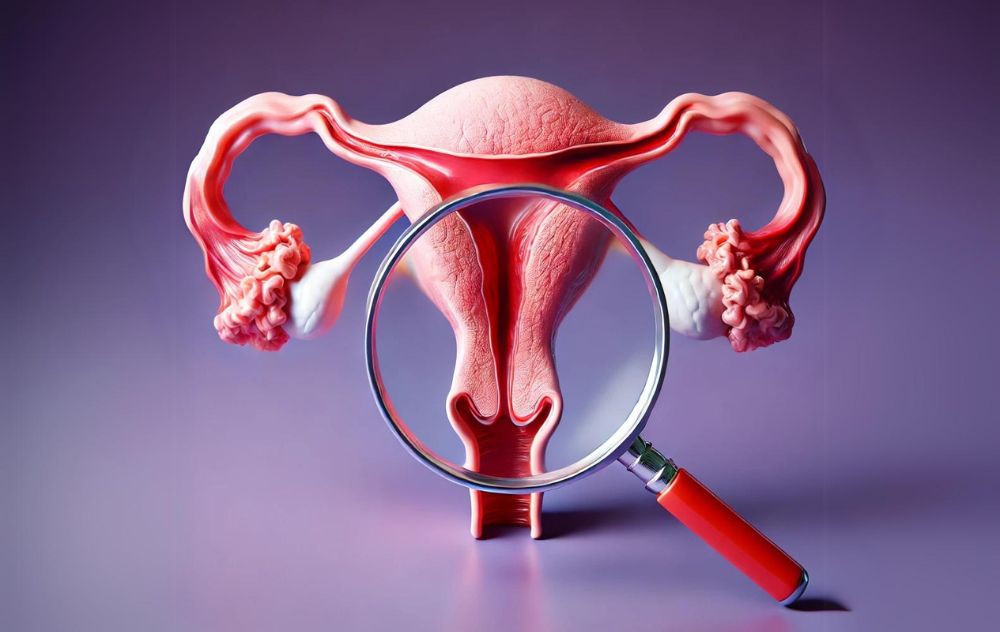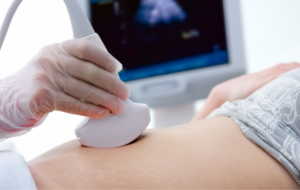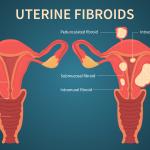
What Causes An Enlarged Uterus?
Most women associate an enlarged uterus with pregnancy, but that’s not the only reason your uterus can become enlarged. Large or multiple fibroids can cause an expansion of the uterus. Some women may notice weight gain, a bloated belly, or a feeling of fullness in the lower abdomen, while others may not notice it at all. However, it’s important to know enlarged uterus causes to ensure you get the right treatment.
Many of our patients reveal they first noticed a change when their pants did not fit or their belly felt full or looked expanded. A pelvic exam or an imaging test such as an ultrasound or MRI can be used to diagnose an enlarged uterus.
Uterine Fibroids
Uterine fibroids are benign growths that can be found inside or on the outside of the uterus. As they receive nutrients from the blood supply of the attached artery, these fibroids can continue to grow.
You may have one or several, growing separately or in clusters. As they get larger, these fibroids can cause your uterus to expand and make you look like you’re pregnant.
Symptoms of Uterine Fibroids
Every woman’s experience with fibroids is very different. Some women with fibroids may not experience any symptoms; however, others may struggle with chronic pain. Having an expanded uterus is just one of the possible symptoms you may experience if you have fibroids, others include:
- Heavy period lasting more than 10 days per month is the most common symptoms of fibroids
- Severe pelvic pain or cramping which occurs before or during the period
- Anemia caused by heavy bleeding and longer than normal menstrual cycles
- Bleeding between menstrual cycles, caused by fibroids that distort the uterine lining
- Pain during intercourse, which may occur if the fibroid is located near the cervix
- Frequent urination or difficulty emptying the bladder because the fibroid presses against the organ
- Constipation, which often occurs when the fibroid grows larger and presses against the rectum or bowel
- Lower back, or leg pain
Want to learn more about uterine fibroids? Take our quiz to find out if fibroids could cause your painful symptoms.
TAKE OUR FREE FIBROID SYMPTOM CHECKER
Enlarged Uterus Causes
Adenomyosis
Adenomyosis is one of the causes of an enlarged uterus. It is a condition that occurs when the inner lining of the uterus grows into the muscular wall of the organ. This tissue can cause the uterus to expand up to twice or triple its normal size. It will break down and cause pain that is often more severe during your period than what would be expected.
Ovarian Cysts
Ovarian cysts are fluid-filled growths that develop inside or outside the ovary. You may not have any symptoms or even be aware that a cyst has developed. However, they can grow quite large and cause pain and other symptoms. While the cysts don’t grow in the uterus or affect its size, they can make you look like you’ve gained weight, similar to an enlarged uterus.
Uterine Cancer
You can develop cancerous tumors in the uterus separate from uterine fibroids. These cancerous growths can grow quite large, causing the uterus to be extended as if you were pregnant.
Pregnancy
Pregnancy is the most common and well-known reason for an enlarged uterus. The uterus must expand during pregnancy to accommodate the growing baby. To accurately convey the change in size, think of a normal uterus as about the size of a lemon that grows to the size of a watermelon during pregnancy.
MORE QUESTIONS? TALK TO A FIBROID SPECIALIST NOW
Why Fibroids Sometimes Cause An Enlarged Uterus
One of the most common enlarged uterus causes is fibroids. Fibroids often grow within the muscle tissue of the uterus, sometimes bulging into the uterine cavity or pressing outward against the uterine wall. As they expand, they exert pressure on surrounding uterine tissues and cause the organ to enlarge.
Additionally, fibroids can affect the uterine lining, or endometrium, especially when they protrude into the uterine cavity. This can lead to thickening or irregularities in the uterine lining, which may cause symptoms like heavy menstrual bleeding, spotting, or pain. In cases where multiple fibroids are present, the cumulative growth further increases the likelihood of a notably enlarged uterus, often accompanied by various reproductive and hormonal symptoms
FIND A FIBROID CENTER NEAR YOU
How Fibroids Affect Surrounding Organs
Fibroid symptoms and pain are often associated with pelvic pain or heavy bleeding, but there are other organs that can be affected as well.
- Bladder – Many women who have large fibroids may feel the need to run to the bathroom frequently. They may also have difficulty emptying their bladder if the expanded uterus puts too much pressure on the tube leading to the urethra.
- Rectum – A large fibroid can push down on the rectum, making bowel movements difficult. This is why it is also possible that some women experience constipation or pain while defecating.
- Stomach – Some women may experience the feeling of fullness and may not be able to eat as much as they used to. This can even lead to significant weight loss.
You may have another health condition with symptoms that mimic uterine fibroids. For instance, polycystic ovarian syndrome (PCOS) is a disorder that causes cysts on the ovaries. Many women have PCOS or ovarian cysts and fibroids at the same time.
Another common diagnosis is endometriosis, which is where the uterine tissue grows on the outside of the uterus. You may require treatment of this condition along with fibroids. Diagnosis can be difficult for multiple enlarged uterus causes, so it’s important to see a specialist.
Treatment For An Enlarged Uterus
If you think your expanded uterus is caused by fibroids, it’s a good idea to schedule a consultation to get checked. An interventional radiologist will use an ultrasound or MRI to diagnose your fibroids and then work with you to create a comprehensive treatment plan. It’s important to consider your treatment options and understand that invasive surgery is not the only solution.
Non-surgical treatments like Uterine Fibroid Embolization offer many benefits such as no hospitalization, a shorter recovery, the ability to preserve your uterus and retain fertility.
Schedule Treatment for Enlarged Uterus
If you’re ready to take the following steps and want to find out more about enlarged uterus causes, or just want to get more information about treatment, give us a call at 855-615-2555 for a consultation.




